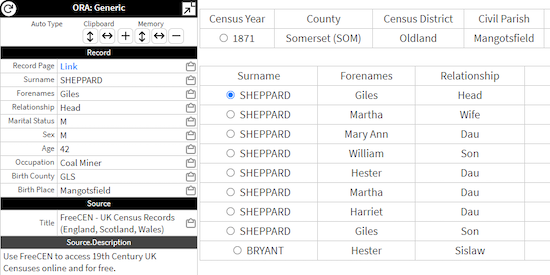The following announcement about Online Repository Assistant (often called "ORA") was written by John Cardinal, the author of the program:
ORA v1.16 Released
Now Supports Hundreds of Repositories
Narragansett, Rhode Island, December 7, 2020 - Family History Hosting is pleased to announce the release of ORA version 1.16. ORA is the "Online Repository Assistant", a web browser extension combined with a Windows program to help you extract data from online repositories and capture the information in your preferred genealogy program. ORA has several features that will save time, reduce errors, and increase the consistency of yourdata entry.
Originally released in June with support for four popular repositories, ORA now has custom support for thirteen repositories and with its new Generic Service it supports thousands of sites that publish genealogy data!
Here's an example where ORA's Generic Service extracted data from a record on FreeCen.org.uk, a site that provides free access to 19th century UK censuses:

Using ORA's Auto Type feature, users can automatically copy the items shown in ORA's Control Panel to fields in the genealogy program of their choice.
Some of the many sites that are now supported by ORA via its Generic Service include vital record collections for many US states and several other countries, probate and will collections in several jurisdictions, BMD indexes for most of the counties in the UK, and hundreds of other sites. ORA can extract data from any site that publishes data in a tabular form as long as the site follows web standards and conventions, and most sites do.
If you publish a One-Name Study or similar, you need ORA. It will dramatically reduce the time you spend gathering data.
For more information about ORA, see its Introduction slideshow at https://www.ora-extension.com/en/intro.htm?v=1.01. The Introduction includes several videos that show ORA in action.
ORA is sold as a subscription service, $24 USD per year. ORA is not affiliated with any of the repositories it supports. ORA does not do any searching for you; it evaluates pages you visit during your normal use of a repository and makes it faster and easier to extract the information you find. For Ancestry, Findmypast, and other fee-based repositories, you must have an account with that repository.